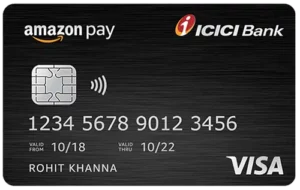Compare and Apply
for the Best Credit Cards
Credit cards are convenient financial instruments provided by the banks to the customers using which they purchase things without cash.







Trending Credit Cards 2024

Flipkart Axis Bank Credit Card
Joining Fee
Rs. 500 + applicable taxes
Annual Fee
Rs. 500 + applicable taxes

Swiggy HDFC Bank Credit Card
Joining Fee
Rs.500 + applicable taxes
Annual Fee
Rs.500 + applicable taxes
What is a Credit Card?
- A credit card is a financial tool that allows cardholders to borrow funds from a financial institution, typically a bank, up to a predetermined credit limit. Unlike debit cards, which are linked directly to a bank account and draw on the available balance, credit cards enable users to make purchases or withdraw cash on credit.
- Every credit card comes with a pre-decided credit limit up to which you can spend. You have to repay the amount spent in a billing period – usually a month – on the due date. You can also pay a minimum portion of the bill and roll over the remainder as credit, for which the bank will charge you interest.
- Credit cards can be used for making both offline and online transactions. They also give you benefits like reward points, cash-back offers and many more.
- With a credit card, you can make purchases even if your bank balance is zero. Of course, you have to pay it back by the due date to avoid a penalty.
How Credit Card Works? explained it in 5 simple steps
1. Swipe (Tap, Insert): You present your card or enter details.
2. Authorization: Merchant checks if you have credit and if it’s valid.
3. Approval: Bank approves if everything’s good.
4. Payment: Bank pays the merchant.
5. Statement and Repayment: You receive a statement and pay by the due date (ideally, in full).
Credit Card Interest Rates in India
| Card Type | Interest Rate Range (p.a.) | APR Range (p.a.) |
|---|---|---|
| Regular Cards | 29.88% – 43.20% | 33.88% – 49.20% |
| Travel Cards | 32.88% – 42.20% | 36.88% – 48.20% |
| Premium Cards | 23.88% – 38.20% | 27.88% – 44.20% |
| Cashback Cards | 34.80% – 44.00% | 38.80% – 50.00% |
| EMI Cards | 12.50% – 36.00% | 16.50% – 40.00% |
Credit Card Eligibility Criteria
| Criteria | General Range | Specifics (Vary by Issuer) |
|---|---|---|
| Age | 18+ | Minimum age (often 21-25 for premium cards); Maximum age (often 65-70) |
| Nationality/Residency | Indian Citizen/Resident | Some cards available to NRIs or foreign nationals |
| Employment Status | Salaried/Self-Employed | Minimum income requirements; Proof of income (salary slips, ITR for self-employed) |
| Minimum Income | Rs. 15,000 – Rs. 25,000 per month | Higher income needed for premium cards; Varies based on card type and city |
| Credit Score | 650+ | Minimum score varies by issuer and card type; Higher score = better card options |
| Existing Credit History | Positive Credit History Preferred | No defaults, delinquencies, or high outstanding debt |
| Other Factors | CIBIL Report, Payment History, Debt-to-Income Ratio | Issuers may consider additional factors for risk assessment |
Documents Required for Credit Card Application
| Document Category | Required for Most Cards | May be Required |
|---|---|---|
| Identity Proof: | ||
| – Passport | ✔ | |
| – PAN Card | ✔ | |
| – Driving License | ✔ | |
| – Aadhaar Card | ✔ | |
| – Voter ID Card | ✔ | |
| Address Proof: | ||
| – Utility Bill (electricity, water, phone) | ✔ | |
| – Bank Statement | ✔ | |
| – Rental Agreement | ✔ | |
| Income Proof: | ||
| – Salary Slips (latest 3 months) | ✔ (Salaried) | |
| – ITR Returns (latest 2 years) | ✔ (Self-Employed) | |
| – Business License/Registration | ✔ (Self-Employed) | |
| Additional Documents: | ||
| – Signature Verification Letter from Bank | Sometimes | |
| – NOC from previous employer (if applicable) | Sometimes |
Credit Card Fees and Charges
| Fee/Charge | Description | Typical Range |
|---|---|---|
| Annual Fee | Yearly charge for card membership. | Rs. 0 – Rs. 5,000+ |
| Renewal Fee | Additional charge after initial year (often waived with certain conditions). | Rs. 0 – Rs. 2,000+ |
| Cash Advance Fee: | Charge for withdrawing cash from an ATM or bank using your credit card. | 2.5% – 5% of transaction amount, minimum Rs. 100 – Rs. 500 |
| Foreign Transaction Fee: | Charge for using your card outside of India. | 1% – 3% of transaction amount |
| Late Payment Fee | Charge for making a payment after the due date. | Rs. 100 – Rs. 500 per instance |
| Over-limit Fee | Charge for exceeding your credit limit. | Rs. 250 – Rs. 500 per instance |
| Minimum Payment Charge | Fee for paying less than the minimum required amount on your statement. | 5% of outstanding balance, minimum Rs. 100 |
| Returned Payment Charge | Fee for a payment that is rejected by your bank. | Rs. 250 – Rs. 500 per instance |
| Card Replacement Fee | Fee for replacing a lost or damaged card. | Rs. 100 – Rs. 500 |
| Other Charges | May include charges for additional cardholder, statement duplication, SMS alerts, etc. | Varies depending on the issuer and service |

How to apply for credit cards at Apnee Bank?
- Log onto Apnee Bank.
- Select “Credit Cards” and Click Apply now
- Enter the required information
- Upon providing the information, you can see credit card options from multiple banks
- Compare, analyse and apply for the best card that suits your requirements.
- Submit the necessary documents, and the application will be forwarded to the bank concerned. A representative from the bank will call you soon for documentation.
Blogs
The big design: Wall likes pictures
-
Posted by
- 0 comments
New home decor from John Doerson
-
Posted by
- 0 comments
Minimalist Japanese-inspired furniture
-
Posted by
- 0 comments
Creative water features and exterior
-
Posted by
- 0 comments
Frequently asked questions
In these days of digital lending, the loan approval process has become very quick. There are several banks offering instant personal loans and pre-approved loans based on your relationship with the bank in few seconds of your consent. Banks like HDFC, ICICI, offer an instant personal loan to its customers and have been customer's choice for personal loans.
Most banks require a minimum salary of Rs. 20000 and above for personal loan eligibility. However, there are many NBFCs like Bajaj Finser, Tata Capital, and Hero Fincorp that can offer personal loan for Rs. 15000 salaried person
Your credit score is an indicator of your credit worthiness. Normally, banks and NBFCs expect a credit score of Rs. 750 and above. However, with NBFCs, you can get a personal loan with credit scores from 650. The decision to approve or reject your loan application, however, lies with the discretion of the NBFC
Generally, the tenure of a personal loan ranges from 12 months to 60 months. The tenure, loan amount, and the interest rate can vary based on borrower's income, credit needs, and more
Personal loan is a unsecured loan, since the bank does not require any collateral from the user.







